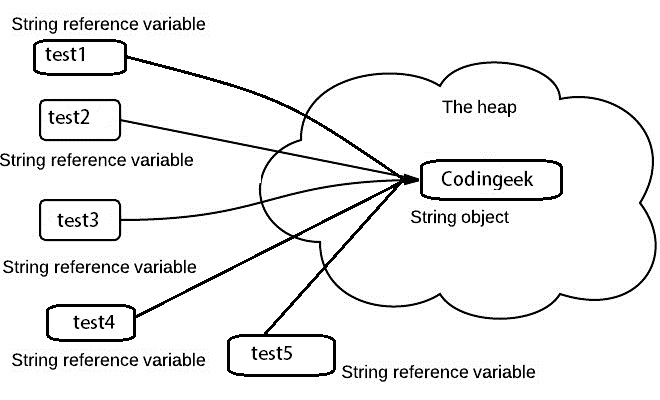Why Are Strings Immutable in Java? Comprehending the Core Concepts
What Is Unalterable Strings and Exactly How It Works
In the realm of shows, recognizing the principle of immutable strings is vital for developing robust and safe and secure applications. Unalterable strings refer to strings that can not be altered after they are developed, making sure data honesty and predictability within the code. This fundamental concept plays a crucial role in various shows languages and offers an unique method to handling data. By exploring the complexities of just how unalterable strings work, one can reveal a world of benefits and possibilities that can raise the quality and performance of software development.
The Basics of Unalterable Strings
Immutable strings, as a fundamental principle in programs, are character sequences that can not be transformed when they are produced. This means that as soon as a string is designated a value, that worth can not be modified. In languages like Python and Java, strings are immutable objects, resulting in numerous ramifications in terms of memory administration and data stability.
One of the crucial benefits of unalterable strings is that they provide a complacency in information control. Considering that the content of an unalterable string can not be modified, it ensures that the initial information continues to be undamaged, minimizing the danger of unplanned changes during program execution (Why are strings immutable in Java?). This home likewise simplifies debugging procedures, as designers can rely on that when a string is specified, its worth will certainly not be unintentionally altered
Furthermore, unalterable strings help with reliable memory usage. When a new string is created based on an existing one, as opposed to customizing the original string, the brand-new value is kept individually. This strategy boosts performance by decreasing memory fragmentation and streamlining memory allotment processes. Generally, understanding the basics of unalterable strings is crucial for mastering shows ideas and optimizing code effectiveness.
Advantages of Immutable Strings
Structure upon the protection and effectiveness benefits of immutable strings, their benefits reach improving code dependability and simplifying concurrent shows jobs. By being unalterable, strings can not be changed after production, which removes the danger of unplanned changes in the information they store. This intrinsic immutability ensures that once a string is produced, its worth stays continuous throughout the program's implementation, decreasing the opportunities of pests created by unexpected modifications.
Furthermore, unalterable strings add to code integrity by making it easier to reason about the state of a program. Given that strings can not be changed, developers can trust that a string will certainly constantly hold the very same worth, simplifying debugging and maintenance efforts. This predictability leads to extra steady and dependable codebases.

Execution in Shows Languages
Within numerous programming languages, the unification of unalterable strings is a fundamental element that influences just how information is handled and manipulated within code structures. The execution of unalterable strings differs across different programs languages, with each language supplying its very own devices to sustain this principle.

On the other hand, languages like C and C++ do not have built-in support for immutable strings. Programmers in these languages must manually execute immutability by implementing rules within their code to avoid straight modifications to string objects.
Best Practices for Dealing With Unalterable Strings
When handling unalterable click for more info strings in shows languages like Java and Python, adhering to finest practices ensures safe and efficient Visit Your URL information manipulation. One of the essential best practices is to use StringBuilder or StringBuffer as opposed to directly controling strings, particularly when handling comprehensive concatenation procedures. These courses give mutable choices for string manipulation, aiding to avoid unneeded memory allowances and enhancing performance.
An additional ideal method is to use string interpolation or format functions given by the language instead of hands-on concatenation. This not only improves readability however additionally help in preventing usual risks such as unintended string modifications. In addition, when dealing with sensitive information such as passwords or API secrets, it is important to avoid storing them as plain message in immutable strings. Using safe storage space mechanisms like char arrays or specialized collections for managing delicate info helps alleviate safety dangers connected with immutable strings.
Real-world Applications and Examples
Discovering useful executions of unalterable strings in different sectors exposes their significant effect on data honesty and system dependability. In the medical care market, immutable strings play a crucial role in guaranteeing the security and privacy of individual data. By preventing unauthorized modifications to delicate info such as medical documents and prescriptions, unalterable strings aid keep compliance with rigorous privacy regulations like HIPAA.
Economic establishments additionally profit from the unalterable nature of strings to enhance the protection of consumer information and purchase documents. Unalterable strings assist prevent fraudulence and resource unapproved alterations to economic information, supplying a robust protection versus cyber risks and making sure the count on and confidence of customers.

Conclusion
In conclusion, immutable strings are fixed and unchangeable series of characters that supply advantages such as thread safety and improved efficiency in shows. They are implemented in different programming languages to ensure information stability and security. Finest techniques for dealing with immutable strings consist of preventing straight adjustments and utilizing methods that return new string objects. Real-world applications of unalterable strings include information file encryption, caching, and string manipulation jobs.
Immutable strings refer to strings that can not be changed after they are produced, making sure information integrity and predictability within the code. When a new string is created based on an existing one, instead than modifying the original string, the new value is saved independently.In languages like Java and Python, strings are unalterable by default, suggesting that once a string item is produced, its value can not be transformed - Why are strings immutable in Java?. Ideal methods for functioning with unalterable strings consist of staying clear of straight modifications and using approaches that return brand-new string things. Real-world applications of unalterable strings consist of information encryption, caching, and string control tasks